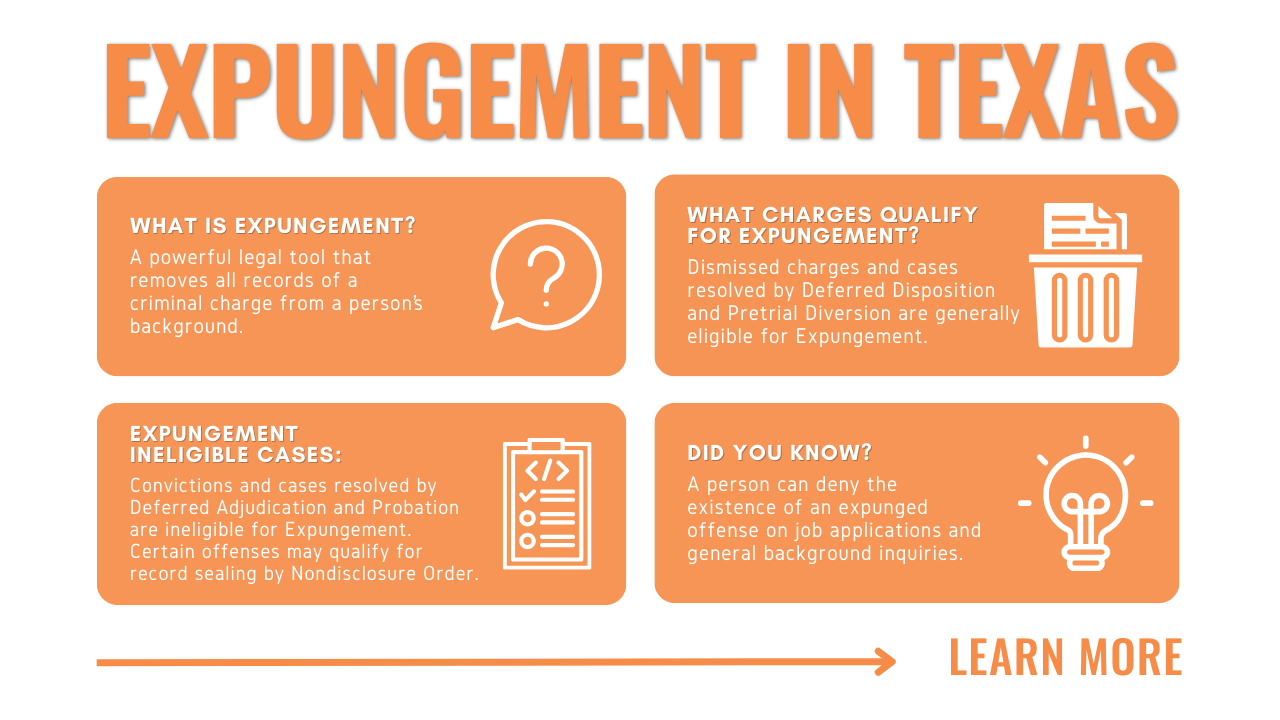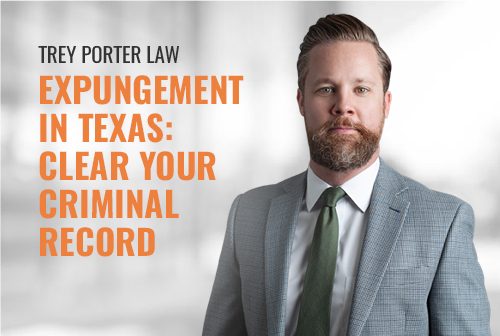Expungement in Texas: Clear Your Criminal Record
Criminal records negatively impact everyday life. Job opportunities, college admissions, loan applications, gun ownership, and international travel are all impacted by criminal records – even if the charges are dismissed.
The only way to delete a criminal record in Texas is through expungement. Expunctions are powerful court orders instructing the Government to delete and destroy the records.
WHAT QUALIFIES FOR AN EXPUNGEMENT IN TEXAS?
Criminal cases that are dismissed with no probation qualify for expungement in Texas. Charges resolved by Deferred Disposition, Pretrial Diversion, and certain specialty court programs (like Veterans Treatment Courts) are also eligible for expungement. The powerful expungement process deletes all records of qualifying criminal charges in Texas.
- How much does it cost to get your record expunged in Texas? It costs up to approximately $5,000 to completely expunge a criminal record in Texas. Expunction fees vary, however, depending on the severity and number of cases to be expunged as well as the quantity of law enforcement agencies requiring service in the lawsuit.
- What cases cannot be expunged in Texas? Probation cases and charges resulting in a conviction cannot be expunged in Texas, however, certain minor, first-time offenses may qualify for a nondisclosure order, which seals the public record. Certain serious offenses with no statute of limitations, like Murder, are also ineligible for expungement depending on the circumstances for the dismissal.
WILL MY EXPUNGED RECORD SHOW UP ON A BACKGROUND CHECK IN TEXAS?
No, a properly expunged record will not show up on a criminal background check in Texas. However, an improper expungement may result in cases that continue to appear on criminal records. It is critical to retain an experienced and knowledgeable Texas expungement attorney when seeking to clear a record in Texas.
- How long does expungement take in Texas? It typically takes 3 to 6 months to fully expunge a criminal record in Texas. This time period is due to busy court dockets and administrative processing times of law enforcement agencies as they delete the expunged records.
- What is the waiting period for expungement in Texas? There is no waiting period to expunge criminal acquittals in Texas. Those seeking to expunge a class C misdemeanor must wait 180 days, while class A misdemeanors and class B misdemeanors require a 1-year waiting period. There is a 3-year waiting period for felony Expunctions. Additionally, some cases require expiration of the criminal offense’s Statute of Limitation prior to expungement (an exception to this is cases where the Defendant is arrested by accident due to mistaken identity and cases where there is no probable cause for the offense).
HOW CAN I GET MY RECORD EXPUNGED FOR FREE IN TEXAS?
Indigent Individuals in Texas can seek a no-cost expungement by executing an Affidavit of Inability to Pay Costs with their local district clerk or with the pertinent court clerk. Defendants who are acquitted in a jury trial also qualify for a no-fee expungement.
- Can I buy a gun with a expunged record Texas? Yes, a person can buy a gun after expungement in Texas as long as they have no other firearm disqualifications like a domestic violence conviction (like battery or Assault-Bodily Injury, and Stalking) or a family violence protective order. However, an improperly expunged record can result in a continued suspension of Second Amendment rights in Texas.
- Do felonies go away after 7 years in Texas? No, felonies do not go away after 7 years in Texas as this is an unfortunate misconception. Even dismissed Felony records are permanent even unless the charge is expunged. The only way to remove a felony record is by expungement in Texas.
WHAT CRIMES ARE NOT ELIGIBLE FOR EXPUNGEMENT IN TEXAS?
Crimes resulting in a conviction and those resolved by community supervision probation and Deferred Adjudication are not eligible for expungement in Texas. Additionally, certain serious felonies with no Statute of Limitation, like Murder, are not eligible for Expunction depending on the reasons for their dismissal.
- What felony charges can be expunged in Texas? Most felony charges that are dismissed with no probation can be expunged in Texas. However, depending on why they are dismissed, certain serious felonies with no Statute of Limitations, like Murder, are frequently ineligible for expungement.
- Can FBI see expunged records in Texas? No, the FBI cannot see properly expunged criminal records in Texas. However, cases that are not properly expunged may still remain in FBI archives. It is crucial to retain an experienced Texas lawyer when pursuing an expungement in Texas.
WHAT ARE THE BENEFITS OF EXPUNGEMENT IN TEXAS?
Expungement is an invaluable legal process that deletes all records of expunged criminal offenses in Texas. A person can even deny the existence of the expunged charge. This is a powerful employment advantage for young Texans, students, and professionals seeking to advance their careers in a variety of fields including insurance, nursing, finance, and education. Expungement can also assist litigants in a number of contexts like family law, child custody, and adoption.
- How far back can a background check go in Texas? Texas background checks can review the entirety of a person’s criminal history. This means even 30-year old charges will appear on a criminal background check in Texas.
- What is the difference between sealed and expunged in Texas? An expunged charge is deleted from a person’s record and will not appear on any agency’s criminal background check if properly expunged. A record sealed by nondisclosure order will not appear on a public background check conducted by a private agency but is still visible to law enforcement and certain state agencies.
HOW LONG DOES A MISDEMEANOR STAY ON YOUR RECORD IN TEXAS?
Misdemeanors stay permanently on criminal records in Texas and do not automatically disappear from a person’s criminal background. Even dismissed misdemeanors are permanent unless they are expunged. The only way to remove an eligible misdemeanor from a criminal record is by expungement in Texas.
- Do arrests without conviction show up on a background check in Texas? Yes, arrests appear on criminal records in Texas even when they result in dismissed charges. The only way to remove an eligible arrest from a criminal record in Texas is by expungement.
- Can I own a gun with an expunged felony in Texas? Yes, a person can own a gun after felony expungement in Texas as long as they have no other disqualifying factor like a domestic violence conviction or a separate felony conviction (including Criminal Solicitation, Burglary, Money Laundering, Robbery, and Assault with a Deadly Weapon). However, an improperly expunged felony can result in continuing suspension of Second Amendment rights.
DO I NEED A LAWYER FOR EXPUNGEMENT IN TEXAS?
Yes, the Texas expungement process is complex, requiring an understanding of the law, the rules of evidence, civil procedure, and the criminal justice system. An improper expungement can have devastating consequences, like pretextual and groundless law enforcement traffic stops. Expungement is therefore best handled by an experienced Texas Expunction lawyer.
- Who can see sealed records in Texas? Law enforcement officers and certain government agencies that regulate professional employment occupations, like the State Bar of Texas or the Texas Medical Board, can see sealed records in Texas. A full list of these agencies is set forth in Texas Government Code section 411.0765.
- Does your criminal record clear after 7 years in USA? Criminal records do not automatically clear after 7 years. In Texas, even dismissed charges remain on criminal records permanently unless they are expunged. The only way to clear a criminal record in Texas is by expungement.
WHO QUALIFIES FOR EXPUNGEMENT IN TEXAS?
Individuals with criminal charges dismissed without probation qualify for expungement in Texas. Those who resolve their cases by Deferred Disposition, pretrial diversion, or certain specialty court programs (like Veterans Treatment Court) also qualify for expungement in Texas.
- Does a misdemeanor show up on a background check after 7 years in Texas? Yes, a misdemeanor does show up on a criminal background check after 7 years in Texas. Misdemeanor records (including common class C misdemeanor offenses) do not ever automatically disappear from a person’s criminal record. The only way to delete an eligible misdemeanor record is by expungement in Texas.
- How much does it cost to expunge a misdemeanor in Texas? It costs up to approximately $5,000 to completely expunge a misdemeanor case in Texas. Expunction fees ultimately vary according to the number of cases to be expunged as well as the quantity of law enforcement agencies involved in the case.
CAN LAW ENFORCEMENT SEE EXPUNGED RECORDS IN TEXAS?
No, law enforcement agencies cannot see properly expunged criminal records in Texas because expungement destroys all records of the case. However, improperly expunged records may appear in law enforcement archives which is why it is imperative to retain an experienced and effective Texas expungement lawyer when seeking to clear a criminal record.
- What cannot be expunged in Texas? Criminal convictions and offenses resolved by probation cannot be expunged in Texas. However, certain minor, first-time convictions and probation cases may qualify to be sealed by nondisclosure order. This includes some DWI convictions with ignition interlock device requirements.
- Do expunged records show up on fingerprinting Texas? No, property expunged records do not show up on a fingerprint background check in Texas as the Expunction process destroys all records of a charge. However, an improper expungement may result in cases that continue to appear on fingerprint background checks in Texas.
HOW DO YOU START THE EXPUNGEMENT PROCESS IN TEXAS?
Expungement is a legal process initiated by filing a Petition for Expunction in the proper court. An Expunction petition should be notarized and list all the necessary law enforcement agencies for the expungement (including the prosecutor or district attorney’s office). This is a complex process that is ideally handled by experienced Texas criminal defense and expungement lawyers.
- Do misdemeanors go away Texas? No, misdemeanors never automatically go away and disappear from criminal records in Texas. The only way to remove a misdemeanor record and information from a person’s criminal history in Texas is by Expunction. Additionally, Defendants who disregard pending misdemeanor cases are subject to arrest and further criminal prosecution in Texas.
- How long does it take for an expungement to process in Texas? It can take between 3 to 6 months for an expungement to fully process and for a criminal record to be completely expunged. This time delay is typically due to busy court dockets and administrative processing times in Texas law enforcement agencies.
WHO CAN SEE MY EXPUNGED RECORD IN TEXAS?
Properly expunged records are not visible for any person or agency in Texas. However, an improper or deficient expungement can result in cases that continue to appear in criminal record databases.
- How long after a felony can you get it expunged in Texas? A person can immediately expunge a felony following an acquittal. Felonies dismissed without probation require a 3-year waiting period and some cases also require expiration of the Statute of Limitations for that offense.
- How do I clear my criminal record in Texas? The only way to clear a criminal record in Texas is by Expunction. Expunction is a powerful legal process that deletes all records of a criminal charge in Texas.
WHAT MISDEMEANORS CAN BE EXPUNGED IN TEXAS?
Misdemeanors that are dismissed without probation can be expunged in Texas (this includes Disorderly Conduct, Public Intoxication, Driving Under the Influence, Driving While License Invalid, and other petty alcohol and drug cases). Additionally, misdemeanors resolved by Deferred Disposition, pretrial diversion, and some specialty court programs (like Veterans Treatment Courts) can also be expunged in Texas.
- How long does a felony stay on your record for a background check in Texas? Felonies stay permanently on records for background checks in Texas. Even a dismissed felony with no grand jury indictment will appear permanently on a background check unless it is dismissed. The only way to remove a felony from a background check in Texas is by expungement.
- How do I seal my record in Texas? A person can seal a criminal record in Texas by filing a Petition for Nondisclosure in district court or in the proper court of jurisdiction. If this petition is granted by the trial court judge, the public records of the charge (including a plea of guilty or nolo contendere) are sealed in Texas.
CAN LOCAL POLICE SEE EXPUNGED RECORDS?
No, local police cannot see properly expunged records (including drug offenses, theft, identity theft, indecent exposure, and even indictments, bail, actual innocence, prison sentence, plea, post conviction pardon, and appeal records) as an expungement deletes all records of the relevant charge. However, a deficient expungement may result in cases that are visible for local police officers. This is why it is critical to retain an experienced expungement lawyer and law firm when seeking to expunge a charge in Texas.
- Can you clean your record in Texas? Yes, a person can clean their record in Texas by Expunction. Expunction is a powerful legal process that deletes all records of a charge and allows an individual to deny existence of the expunged case. The only way to clear a criminal record in Texas is by expungement.
- Can you expunge a felony in Texas? Yes, a felony can be expunged in Texas if it was dismissed without probation or resolved by a pretrial diversion program. However, certain serious felonies with no Statute of Limitation, like Murder, or often ineligible for expungement depending on the circumstances for their dismissal.
HOW LONG DOES IT TAKE FOR YOUR RECORD TO CLEAR AFTER EXPUNGEMENT IN TEXAS?
It can take between 3 to 6 months for a criminal record to clear after expungement in Texas. This delay is primarily attributable to the administrative processing time of law enforcement agencies like the Texas Department of Public Safety deleting the relevant records from their archives.
- What are the requirements for expungement in Texas? As a primary requirement, a case must first be eligible for expungement, which usually entails those cases that were dismissed without probation or that were resolved by Deferred Disposition or pretrial diversion. An individual must then file a notarized Petition for Expunction in the proper court that complies with Chapter 55 of the Texas Code of Criminal Procedure.
- How long till a felony is off your record in Texas? Felonies do not ever automatically disappear from criminal records in Texas. The only way to remove an eligible felony charge from a Texas criminal record is by expungement. There is a 3-year waiting period before a person can expunge a felony though some cases also require expiration of the relevant Statute of Limitation.
HOW DO I REMOVE A FELONY FROM MY RECORD IN TEXAS?
An individual can remove a felony from their criminal record by filing an Expunction in Texas. However, only felonies that are dismissed without probation and those resolved by pretrial diversion are generally eligible for expungement in Texas.
- What felonies cannot be expunged in Texas? Felony convictions and probation cases are not eligible for expungement in Texas. Additionally, certain serious felonies with no Statute of Limitations, like Murder and Capital Murder, are often ineligible for expungement even when dismissed. However, felony convictions subject to pardon by the Governor of Texas and those subject to reversal upon actual innocence in an appeals court (like the Texas Court of Criminal Appeals) are eligible for expungement.
- What felonies cannot be sealed in Texas? Felonies resulting in conviction and those resolved by community supervision probation (not Deferred Adjudication) are ineligible for sealing by nondisclosure order. Domestic Violence felonies that are resolved by Deferred Adjudication are also not eligible for nondisclosure in Texas.
BEST LAWYERS FOR EXPUNGEMENT IN TEXAS
Trey Porter Law is a top-rated Texas law firm representing individuals facing Criminal & DWI charges across the Lone Star state. Committed to uncompromising results, TPL leverages 40+ years of combined experience, professional relationships, and dynamic, high-powered advocacy to get the best result for every client, every time. TPL’s experience is the foundation for its hard-earned reputation of getting big wins in the toughest cases.
Contact Trey Porter Today
Request a free consultation
The stakes are high. Criminal charges can have devastating, lifelong consequences. During the free, confidential consultation, Mr. Porter will answer questions surrounding your legal matter, and discuss and identify potential defenses.
If you have been arrested and charged with a crime, the State is working on your conviction. It’s time to start building your defense.












